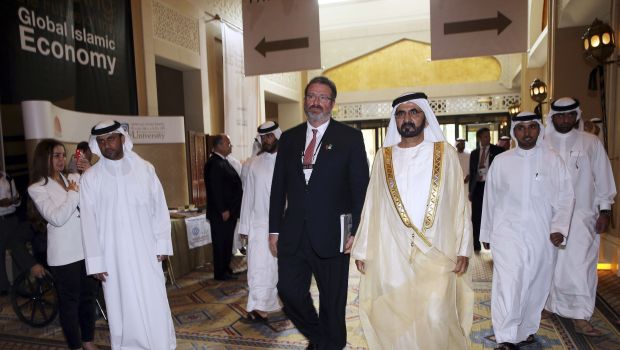
United Arab Emirates’ Prime Minister and Ruler of Dubai Sheikh Mohammed Bin Rashid Al Maktoum (3rd R) and Thomson Reuters President and Chief Executive Officer James Smith arrive for the Global Islamic Economy Summit 2013 in Jumeirah on November 25, 2013. (REUTERS/Mohammed Omar)
Dubai, Reuters—Private investors from Gulf Arab countries, including a royal family from the United Arab Emirates, plan to establish the first full-fledged Islamic bank headquartered in the euro zone, an executive said on Tuesday.
The investors aim to launch the venture, named Eurisbank, in Luxembourg during the last quarter of 2014, said Ammar Dabbour, managing partner at Excellencia Investment Management.
With initial capital of EUR 60 million, the bank would offer retail, corporate and private banking services, and would open branches in Paris, Brussels, the Netherlands and Frankfurt.
In addition to the royal family from the UAE, Eurisbank will be owned by a bank from a country in the Gulf Cooperation Council and other private investors, said Dabbour, who declined to name them.
Excellencia, an Islamic fund manager based in Luxembourg, has been contracted with consultants Deloitte to handle procedures for establishing Eurisbank, he said.
The founders of the bank plan to apply for a license in January and expect to obtain regulatory approvals by April, Dabbour told reporters at the Global Islamic Economy Summit in Dubai.
Islamic finance, which bans interest payments and pure monetary speculation, has been slow to develop in Europe, but Luxembourg has successfully marketed itself as a center for issuing and trading Islamic bonds.
Since the global financial crisis, some European governments have shown more interest in Islamic finance, partly because it could be a way to attract cash-rich funds from the Gulf and southeast Asia.
The European Central Bank and the Malaysia-based Islamic Financial Services Board worked this year on a joint study on policies affecting Islamic finance in Europe. Munich-based FWU Group, which offers Islamic insurance solutions, has issued Islamic bonds since last December.

Trackbacks/Pingbacks